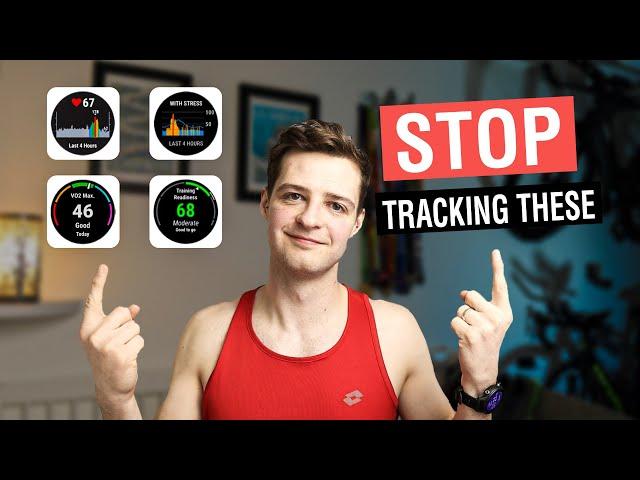
Why I Stopped Using Garmin Metrics Like HRV And Training Readiness
Комментарии:

I don't know if I'm lucky or what but for me, my watch always reflects perfectly on how I feel during the given day. Not sure if it's because I always train with HR strap or if it's because I update my zones in weekly bases (and weight in every morning) but I find it extremely accurate.
Hell, even my VO2max is spot on to one that I do in a lab test on treadmill.
One thing I do agree with though - Training Readiness can be telling funky stuff if your HRV is off-balance (eg. you were sick and the 7 day average has not stabilized yet)

I switched to Coros for my current marathon training block because of all of this, I do love Garmin but FOR ME all the data would dictate how I felt for my day too much, morning report, low HRV or Sleep Score, even if I felt good I would think, huh I will have a rough day or run etc...For some the data is probably great but it was influencing me too much.
Ответить
Same here, the only Garmin metric I pay attention to is sleep. And I don’t use the recommendations, I budget at least 8 hours and like to see the different cycles of sleep the next morning.
Ответить
Interesting topic. I think in your case you were relying on the garmin info too much to the point you were trying to influence it.
For me personally i use it as a gauge, for instance if i ran poorly id look at the data and see if there was something off. Training rediness low or high stress throughout the day etc.
I think where i find garmin quite spot on is the peaking training status when it appears. Im always at my best so something must be accurate amongst all the data if it all lines up at a particular point.
If say i go on a bender my garmin 265 does seem to pick up that lack of sleep/hangover and takes a few days to return to normal. So seems good there as well.

Never slept better after ditching my Garmin watch
Ответить
I generally feel that hrv indicates nicely how I feel, but I dont skip training cause of it
Ответить
Metrics are in line with how i feel for me. So i stick with them.
Ответить
Garmin data is nonsense.
I’m 69 and my Garmin recommends me to do sprints at 5.10 miles pace. I could only do 5.30 miles 30 years ago at my peak
HR readings are miles out compared to Polar & Apple

Good video and i think you made the right decision for you. I will personally keep it.
1) it helped me so much imoroving my sleep.
2) almost stopped drinking and other unhealthy habits.
3) it helped me feel my body more. It sounds a bit unexpected, but i prefer charts and numbers to understand my feelings
4) i wouldn't be able to do zone 2 running without it and keep it slow enough
5) for me it is really hard to increase volume gradually and things like training load help a lot.
6) i don't really care that much about the metrics that i see. It is logging so i don't have to keep attention to it. If i want to understand some correlation later, i can return back
7) seeing the progress on some metrics is quite encouraging for me
8) when i see it go down, I know i have to make adjustments to lifestyle.

People forget that garmin is not your coach, its your support device.
You can use it to guide you. And its pretty good estimation over longer period of time

I've known for a long time that Garmin metrics are a guess at best, as the scales tell me my BMI is going up and down directly correlated with weight, not muscle. The watch does the same, just best guesses based on inaccurate data. I believe the demonstrated metrics such as actual heart rate, weight, and time, but use everything else as a VERY rough guide.
Ответить
My Garmin 955 is pretty much accurate for most of the metrics but I agree with you, overtime waking up and anxiously going through my morning report affected me more psychologically than it did physiogically. I've since ditched them for the last couple of weeks and I really feel much better every morning!
Ответить
Anybody who knows anything knows HRV is a completely bogus training metric, whether from Garmin or anyone else. There are simply too many unaccounted-for biological factors that cause HRV to vary.
Ответить
After many years of following these metrics didn't lead to better running, I've been moving to training to PRE and paying attention to my HR on runs that week. It's made running more enjoyable.
Ответить
Nobody said Garmin is perfect, but keeping track of your health and fitness is somewhat important.
Ответить
For me data points are too general and not reliable for small analysis and the trends provide big picture. However, the training readiness seemed always off.
Ответить
I’ve found that since I’ve moved up from less expensive to more expensive and complicated garmin watches, the best guide to my fitness, health and recovery is the rhr number.
Ответить
any tips for more sleep time (also better sleep)? average sleep is only almost 6 hours or less
Ответить
I get what you're saying. It's just like weighing yourself everyday, can be useful for some people, but lead to eating disorders for others. I'm not emotionally attached to my Garmin data, but do track 24/7. I don't really pay much attention to 'training readiness', or my sleep score, for me HRV, stress and RHR are the most important. Those 3 metrics are what helped discover my thyroid disease, as they got out of control long before I started to have actual symptoms.
Ответить
Sorry but this video is all over the place. Firstly you can’t mix validity and reliability. These are two different criteria in science that mean totally different things. You are actually talking mostly about reliability. Then you are talking about is “guesswork”. Garmin actually correlates a whole lot of stuff with their watches. Meaning they have real data to back up their estimation. You can’t really evaluate how good their estimation is. Third is that you are rather describing personal insecurities that you might want to talk about with a psychologist.
My take on Garmin devices: They are accurate enough to determine stress and they can aid very well to manage stress and recovery. Take everything with a grain of salt. I even use them with clients in psychotherapy to mange their stress levels. They work fine for that purpose. If you are an aspiring athlete I would advise you to use even more data and try to aggregate it to get a clearer picture. Either use other devices or other apps to analyze your data. Thank you for reading my lengthy thoughts!

I love my Garmin, but I’m also realistic about what it does for me. I use a 935 and an HRM Pro chest strap. The amount of data is unreal, and most of it—-for me—is unusable in the moment or unusable within 24 hours. HR measures with the chest strap is awesome. My GPS is accurate to within .01 miles consistently and I’ve measured it against a distance measuring wheel. Sleep has been an above average metric. A couple metrics that were valuable many months after the fact were ground contact time and Left-right strike balance since I had broken my ankle and to assess whether or not my biomechanics were different after healing, I could compare old data to new data. The data is pretty unusable in the moment, but great to have for comparison later if you need it. The elevation is complete garbage….rarely accurate. Distance travelled when using the treadmill is always bad. Training status—-for me—-is absolutely laughable. I can go from unproductive to peaking to detraining in a 4 day time span….I literally use this metric for sheer entertainment value because it means absolutely nothing. VO2 max is also a joke. Though I have never measured it in a lab, my VO2 max from Garmin has jumped 8 points before after one hard steady effort…..and that steady effort was part of a normal training block where I was training 6-7 days per week. Again—-I love my Garmin but I know what doesn’t apply to me and my type of endurance training—-and that’s ok!
Ответить
I like the data as reference, but I just wish Garmin can produce additional devices, so I don't have to wear a ugly watch for 24/7
Ответить
Those metrics work very well for me. All metrics have errors for all devices but are useful if you know how to interpret them. The video is useless and very very biased.
Ответить
I work in counseling psychology and these metrics make me think about psychology tests. We always take the raw data with a grain of salt and it is critical put them into context of the patient's situation and think about the biaises that might have effected the results.
Thank you for the video :)

I've stopped using the metrics, but mainly because it throws a wobbler with training load. I swim with form goggles now, so it doesn't pull through swim workouts to garmin. And then they updated the algorithm so my bike computer doesn't add to the load on my watch. So now it thinks my runs are always 'unproductive' because my watch only considers that
Ответить
Stupid video
Ответить
I used to pay no attention to 5 hours sleep a night or alcohol use.. Tracking has shown me how bad my habits were. I now prioritise sleep, stopped drinking regularly and recovered correctly. It's probably added years to my life.
Ответить
I think it comes down to whether or not you treat health tools as a guide, or a God.
Ответить
Try being an insomniac and wear a garmin, it great fun. I only use the matrix that I need and laugh at the rest.
Ответить
How are you going to record on Strava without the watch?
Ответить
I have a Friend who is into the Hawaii Competitions, and does Competitions that are not even known to anyone. He’s wearing a Rolex. I’m on a Garmin Tactix because I think it’s helpful, but I’m not even running Marathons. So these measurements don’t have much impact on me.
Ответить
I found myself in the same boat. I used to wear my Garmin 24/7. However, I was finding that the sleep data was making me paranoid about my sleep quality. Also, if my HRV was low, it would almost set me up for a bad day. I still use my Garmin to track training, but don't wear at night. I prefer listening to my body.
Ответить
If you want to measure your heart rate (cadence and other parameters such as power) quite accurately, you need to use external sensors, because the built-in optical heart rate monitor is rather inaccurate, especially during intense physical exercise.
Ответить
There is also the question whether Garmin measuring Resting Heart Rate, while you are sleeping at night, is the right number, or whether it should be a number that is measured during a lull in daytime activity.
Ответить
Love this, James. There is so much value in listening to your body and learning what it's telling you. During workouts and in between.
Ответить
I just try to drive my TSB as low as possbile and my CTL as high as possible with a +3 to +5 ramp rate. Suunto user here.
Ответить
I fond my 965 very good. The hrv and stress detection is very good. During a shift as train driver I can see on the stress when I drive a train more likely to have faults. Two times this year I have tried to do hard workouts when the body battery was almost 0 and ended up sick both times. I travel a lot in work and sleep in different hotels with different beds, heat and light conditions. The sleep quality varies a lot but every time I come home to my own dark bedroom with a good bed my sleep is always of the charts and stress very low. It detectes this very good.
I don’t always follow the training recommendations but if the hrv is down over a few days you better make adjustments. And also stress is very hard to pick up on yourself. That’s why people hit the wall because they didn’t realize it before it’s to late. It’s a very good tool if you use it right

Agreed. Thank you. I do get a little emotional about some alerts and have to use a critical eye and listen to my body.
Ответить
I would love to talk more about really low HRV over time. 😊
Ответить
💯
Recently ditchedGarmin for an apple watch. The AW (watchOS 11) doesn't tell me how I feel or interpret metrics; rather the AW shows trends. For activities that require more battery life I use a Coros Pace 3. The pace 3 compliments the AW nicely allowing me to import all data into Apple's Fitness+ & Health apps (and vice-versa). Additionally, Coros again only shows trends and minimizes algorithmic or estimated data. If I need guidance plenty of online coaches exist at a nominal cost and i can easily share my collected data to have a human to human conversation about how to progress.
You can strip away these estimated metrics on a garmin. But garmin uses these estimated metrics to create product dependency and drive up the sales making it difficult to eliminate these "features" completely.

For me the metrics never really work out. Bad sleep equals great sleep score and otherwise. Even HRV is influenced by breathing and many more things, so basically useless.
I only check my resting heart rate. If it is too much elevated I know I am fatigued. Muscle soreness has never fooled me.

I just switched off the morning report.
In General I agree for me it's important to take a step back every now and then and get not to obsessed with the data.
BUT just now it happened that I had massive drops in my metrics although I did not feel too bad but a little bit stressed. But both my night stress level and day level had risen dramatically. So I think you shouldn't be to worried about the day to day ups and downs and go with your body awareness but if metrics deviate dramatically out of a sudden and don't go back to baseline over the course of a couple of days you should think about it and implement some changes. I wouldn't have known without the data.

I found this out the hard way. I started reading Marco Altini's posts a while back on morning measurements so it made moving away from Garmin easier. It was turning me a little neurotic. I only have one question in the morning - can I train and take on todays life/activities/chores. The morning measurement achieves that.
I've moved onto Apple because of the recent vitals app and trusting the accuracy of their data. That adds to the above because rather than being concerned about the exact readings it'll notify for me if anything seems odd - which could indicate an illness brewing, which a morning HRV meausrement or subjective feel won't identify.

Excellent video, so true, the metrics are so off that it is rediculous. I have called Garmin regarding the data being off and their commentary was the data was Estimated. I rest my case.
Ответить
For me, close to 50 this is just another tool, knowing a lot about tech and physiology from a long life as an athlete, coach and just being alive, I love the Garmin. But I also bought a fenix 7s for my son, for his 15th birthday, he got stressed out from the data and monitoring, cause, he is 15 and his life has been around tech, and hence feeling that tech is always right.
I KNOW if my Garmin is wrong if I was calm during my sleep,and I still drank too much alchohol last night, but somehow I still slept well and got a good scoore.... but how are a teen supposed to know that this is just a approximation and not the absolute truth....
This is valid for any tool. Garmin does not claim to be medical correct.... But it is great fun to use if you have some experience.... then the garmin watches can be great as a second point of view.
And finally... my experience is that my watch is REALLY good at analyzing my current fatigue and stress. Its quite remarkable. But still I have enough life experience to think for myself. My 15 year old son doesn´t... and that is a problem , and I´ve told him to take the watch off and just chill....


























